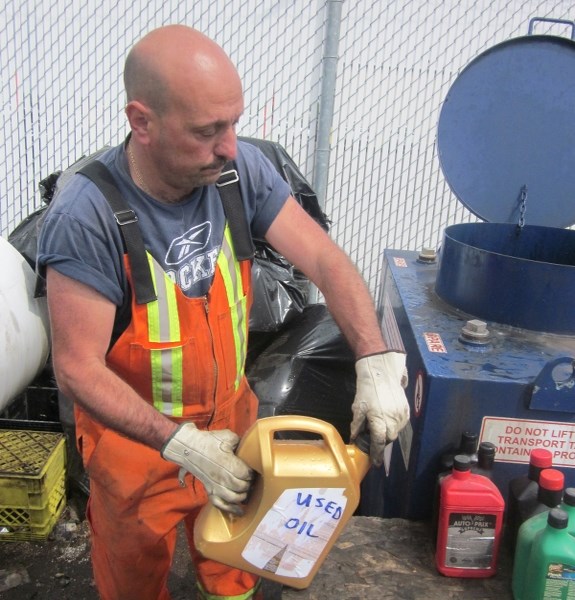It’s been 20 years now, and St. Albert’s annual Take It or Leave It event is still going strong.
Hundreds of local bargain hunters are expected to swarm Servus Credit Union Place today as part of the 20th annual Take It or Leave It swap meet. The annual event invites residents to drop off or pick up unwanted large items for free.
It’s one of the largest events public works hosts each year, said Christian Benson, the city’s solid waste programs co-ordinator, and it typically draws hundreds of visitors. “You see everything,” he said, including kayaks, pedal boats and filing cabinets. “Exercise equipment and bikes go very, very quickly.”
City employee Pat MacInnes founded the event back in 1993 after she saw a neighbour pick up an unwanted bicycle from in front of her house, the Gazette’s archives report. Initially held on Chatelain Drive, the event moved to Servus Place around 2007.
This is a great event that lets people reuse their unwanted stuff, Benson said – he personally had a truckload of items to contribute.
Visitors can drop off and pick up items at the Servus Place parking lot between 8 a.m. and 1 p.m. this June 1. Staff will be on hand to unload vehicles, and will accept pretty much anything except tires, toilets, building materials, propane tanks, barbecues, mattresses and paint.
All items will be claimed on a first-come basis, with staff on hand to arbitrate disputes. Anything left after 1:45 p.m. goes to the dump.
Visitors are encouraged to bring donations to the food bank. Call public works at 780-459-1557 for details.
City residents will be able to ride free and breathe easy next week as part of a national effort to reduce air pollution.
June 5 is Clean Air Day in Canada, and, as usual, St. Albert Transit is offering free bus service all day to city residents. Bus pass holders can also enter to win free monthly bus passes.
Transportation accounts for about 32 per cent of St. Albert’s greenhouse gas emissions, reports the city’s Office of the Environment, much of which comes from cars.
Cars are a significant source of greenhouse gas emissions in St. Albert, said city community sustainability co-ordinator Kalen Pilkington, and the city wants to encourage residents to walk, bike, or bus instead of driving. “Even car pooling is better than taking an individual car.”
One city bus can take 40 cars off the road and prevent about 168 tonnes of pollution a year, reports Environment Canada.
A new city environmental survey suggests that residents think they’re doing well when it comes to protecting the environment, but that many still use that black sheep of trash disposal, the garburator.
Bannister Research surveyed about 800 city residents last April on behalf of the city to learn more about St. Albert’s environmental and waste programs. City community sustainability manager Leah Kongsrude released some of the results to the Environmental Advisory Committee last May 23.
About 75 per cent of respondents agreed that the city was committed to a healthy environment, Kongsrude said, while about 95 per cent said the city’s environment was better than that of its neighbours.
About 90 per cent of residents said the city’s top environmental priority should be to protect its parks and trees, Kongsrude said, with the protection of the Sturgeon River coming second. This was a big change from the city’s last informal environmental survey, she noted, which pegged solid waste and greenhouse gases as the top goals.
Pilkington said she was a little surprised to see that most residents were using their green organics bin in the winter. Those that weren’t were using garburators.
Garburators clog sewer pipes and wastes water and electricity, Pilkington said. She encouraged residents to use the green bin instead, as it produces valuable compost.
Full survey results would be brought to city council on July 8, Kongsrude said.




